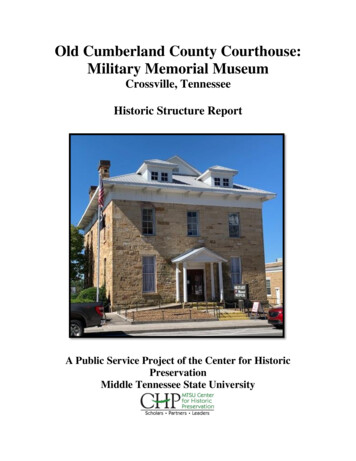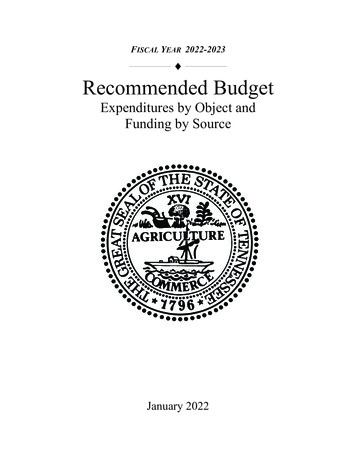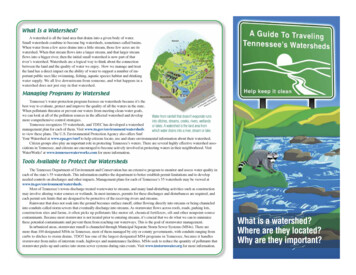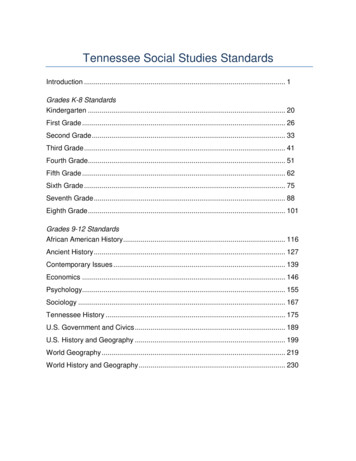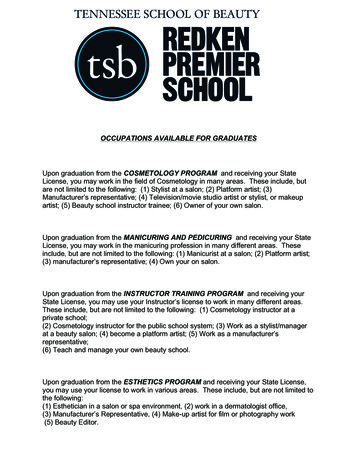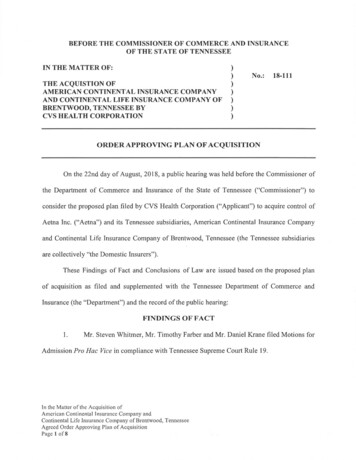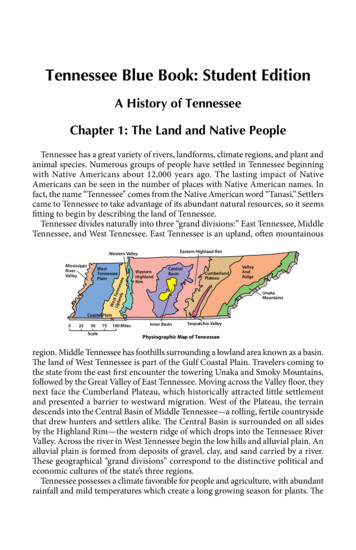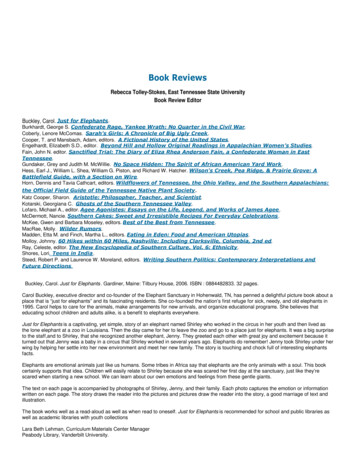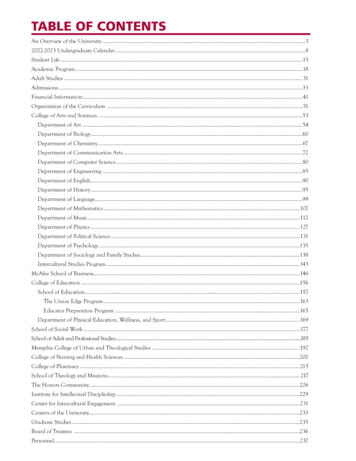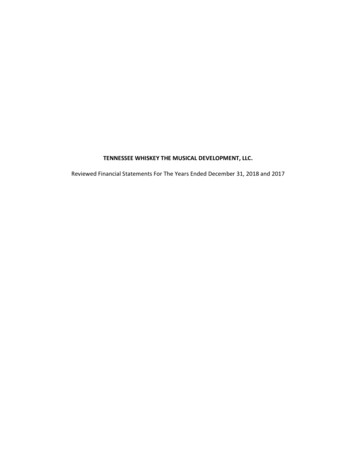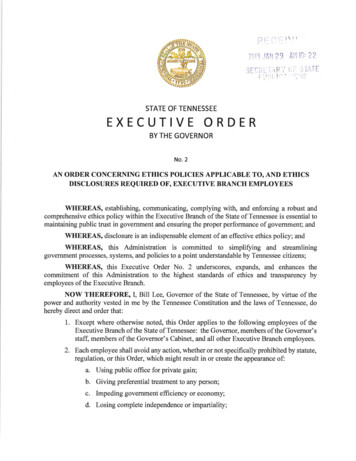
Transcription
i t' 'I I\: .1I\-I; STATE OF TENNESSEEEXECUTIVE ORDERBY THE GOVERNORNo. 2AN ORDER CONCERNING ETHICS POLICIES APPLICABLE TO, AND ETHICSDISCLOSURES REQUIRED OF, EXECUTIVE BRANCH EMPLOYEESWHEREAS, establishing, communicating, complying with, and enforcing a robust andcomprehensive ethics policy within the Executive Branch of the State of Tennessee is essential tomaintaining public trust in government and ensuring the proper performance of government; andWHEREAS, disclosure is an indispensable element of an effective ethics policy; andWHEREAS, this Administration is committed to simplifying and streamlininggovernment processes, systems, and policies to a point understandable by Tennessee citizens;WHEREAS, this Executive Order No. 2 underscores, expands, and enhances thecommitment of this Administration to the highest standards of ethics and transparency byemployees of the Executive Branch.NOW THEREFORE, I, Bill Lee, Governor of the State of Tennessee, by virtue of thepower and authority vested in me by the Tennessee Constitution and the laws of Tennessee, dohereby direct and order that:1. Except where otherwise noted, this Order applies to the following employees of theExecutive Branch of the State of Tennessee: the Governor, members of the Governor'sstaff, members of the Governor's Cabinet, and all other Executive Branch employees.2. Each employee shall avoid any action, whether or not specifically prohibited by statute,regulation, or this Order, which might result in or create the appearance of:a. Using public office for private gain;b. Giving preferential treatment to any person;c. Impeding government efficiency or economy;d. Losing complete independence or impartiality;
e. Making a government decision outside of official channels; orf.Affecting adversely the confidence of the public in the integrity of thegovernment.3. Each employee is expected to comply with the following ethical principles and policiesgoverning financial interests, use of information, and use of government property:a. Financial interests.1.No employee shall enter into or derive any benefit, directly or indirectly,from any contractual arrangement with the State or any of its agencies.In recognition of the fact that many spouses have separate careers, thenormal employment compensation of a spouse whose regular, ongoingemployer or business has a contractual arrangement with the State shallnot be considered a "benefit" to the employee, provided the contractwith the State was procured without any participation, assistance, orinfluence by the employee.11.No employee shall have a direct or indirect financial interest thatconflicts substantially, or appears to conflict substantially, with his orher government duties or responsibilities. "Indirect financial interest" inthis case includes a substantial interest on the part of a member of theemployee's household. This subsection shall not apply to interests thathave been placed into a " blind trust" arrangement pursuant to which theemployee does not have knowledge of the retention or disposition ofsuch interests. This subsection also shall not apply to ownership ofpublicly traded stocks or bonds where such ownership constitutes lessthan two percent (2%) of the total outstanding amount of the stocks orbonds of the issuing entity. If, at the time the employee beginsemployment with the State or at any subsequent time during Stateemployment, the employee possesses such direct or indirect financialinterests, the employee shall divest such interest within a reasonabletime.b. Use oflnformation.1.No employee shall directly or indirectly use, disclose, or allow the useof official information obtained through or in connection with theemployee's government employment and not available to the generalpublic for the purpose of furthering the private interest of personal profitof any person, including the employee; or11.Engage in a financial transaction as a result of, or primarily relyingupon, information obtained through the employee's govermnentemployment.c. Use of government property.2
1. No employee shall make use of the facilities, equipment, personnel, orsupplies of the State or its agencies for private use or gain, except to theextent that the use is incidental or de minimis or is lawfully available tothe general public.4. Gifts.a. No Executive Branch employee shall solicit or accept, directly or indirectly, onbehalf of himself or herself or any member of the employee's household, anygift, including but not limited to any gratuity, service, favor, food, beverage,refreshment, ente11ainment, lodging, transportation, loan, loan guarantee, or anyother thing of monetary value, from any person or entity that: (i) has, or isseeking to obtain, contractual or other business or financial relations with thedepartment or agency of the State of Tennessee in which the individual isemployed; (ii) conducts operations or activities that are regulated by thedepartment or agency of the State of Tennessee in which the employee isemployed; or (iii) has interests that may be substantially affected by theperformance or nonperformance of the employee's official duties.b. Exceptions. The prohibition on accepting gifts in paragraph 4 does not applyin the following circumstances:1. A gift given by a member of the employee's immediate family or by anindividual if the gift is given for a nonbusiness purpose and is motivatedby a close personal friendship and not by the position of the employee.In determining whether a gift falls within this subdivision, the factorscontained in Tenn. Comp. R. & Regs. 0580-01-05-.04(2) shall apply;11. Informational materials in the form of books, articles, periodicals, otherwritten materials, audiotapes, videotapes, or other forms ofcommunication;111. Sample merchandise, promotional items, and appreciation tokens, ifthey are routinely given to customers, suppliers, or potential customersor suppliers in the ordinary course of business;1v. Unsolicited tokens or awards of appreciation, honorary degrees, or bonafide awards in recognition of public service in the form of a plaque,trophy, desk item, wall memento, and similar items; provided that anysuch item shall not be in a form which can be readily converted to cash;v. Food, refreshments, foodstuffs, entertainment, or beverages provided aspart of a meal or other event, if the value of such items does not exceed,per occasion, the dollar amount provided in Tenn. Code Ann. § 3-6305(b)(8), as updated via posting on the Tennessee EthicsCommission's website to account for changes in the average consumerprice index; provided further, that the value of a gift made pursuant tothis subsection may not be reduced below the monetary limit by3
dividing the cost of the gift among two or more persons or entitiesidentified in paragraph 4;v1. Food, refreshments, meals, foodstuffs, entertainment, beverages, orinterstate travel expenses that are provided in connection with an eventwhere the employee is attending a scheduled meeting of an establishedor recognized membership organization which holds regular meetings;andv11. Loans from an established financial institution made in the ordinarycourse of business on usual and customary terms, so long as there areno guarantees or collateral provided by any person described inparagraph 4.c. There may be circumstances where refusal or reimbursement of a gift such as alunch or dinner may be awkward and contrary to the larger interests of the State.In such circumstances, the employee is to use the employee's best judgmentand disclose the gift, including a description, estimated value, the person orentity providing the gift, and any explanation necessary within fourteen (14)days to the Chief Ethics Officer on the form titled "Gift Prohibition ExceptionDisclosure" provided by the Department of Finance and Administration for thatpurpose.5. Disclosures.a. The Commissioner of Finance and Administration shall prepare forms thatshould be utilized to report the information described in this Order and shallmake those forms available to each individual on or before January 1 of eachyear. Such forms and statements can be located on the Commissioner of Financeand Administration's website and shall be completed and filed by the respectiveemployees as follows :1. The Governor and Governor's Cabinet and Cabinet Level Staff.1. Pursuant to Tenn. Code Ann.§ 2-10-115 and§§ 8-50-501 and 502 the Governor and the Governor's Cabinet and Cabinet levelstaff shall file annually the "Statement of Disclosure of InterestForm" with the Tennessee Ethics Commission and the Counselto the Governor on or before April 15th of each year.a. The disclosure shall exceed the statutory requirements ofTenn. Code Ann. §§ 8-50-501 and -502 in one respect.Subsequent to appointment, each covered employeeshall file annually the complete form required uponappointment (as set forth in Tenn. Code Ann. § 8-50501 ), and may not file a letter simply indicating any, orno, changes from the initial filing as is currentlyauthorized by Tenn. Code Ann. § 8-50-504.4
2. The Governor and the Governor' s Cabinet and Cabinet levelstaff shall file annually the "Ethics Policy ComplianceCertification and Conflict of Interest Statement" with the ChiefEthics Officer on or before April 15th of each year.11.All other employees listed on Attachment A of this Order.1. All other employees listed on Attachment A of this Order shallfile annually the " Statement of Disclosure oflnterest Form" andthe "Conflict of Interest and Ethics Policy Receipt Statement"with the Chief Ethics Officer on or before April 15th of eachyear.6. I appoint the Counsel to the Governor to serve as the Chief Ethics Officer for theExecutive Branch charged with administering the provisions of this Order andmaintaining all records related to the ethics policy.7. The Chief Ethics Officer shall convene a meeting of the Chief of Staff, theCommissioner of Finance and Administration, and the Commissioner of HumanResources to take any action necessary or convenient to determine or enforce the ethicspolicy and address any request for exemptions.8. When an employee is in doubt as to the proper interpretation of this Order, theemployee is expected to seek the advice of the Chief Ethics Officer.9. The Chief Ethics Officer shall make the disclosures and statements required by thisOrder available for inspection by the public during normal working hours.10. This Executive Order is intended only to improve the internal management of theExecutive Branch of the State of Tennessee and does not create any right toadministrative or judicial review, or any other right or benefit, substantive orprocedural, enforceable at law or equity by a party against the State of Tennessee, itsagencies or instrumentalities, its officers or employees, or any other person.11. This Executive Order No. 2 supersedes and rescinds Governor Haslam' s ExecutiveOrder No. 20, dated August 31 , 2012, and all other directives and memorandaconcerning ethics policies applicable to the Executive Branch, and all previousexecutive orders, the terms of which are inconsistent with the terms of this ExecutiveOrder No.2, are hereby repealed.IN WITNESS WHEREOF, I have subscribed my signature and caused the Great Seal of the Stateof Tennessee to be affixed this 24th day of January, 2019.5
GOVERNORATTEST:6
ATTACHMENT A TO EXECUTIVE ORDER2POSITIONS COVEREDOffice of the GovernorGovernorDeputy to the GovernorChief of StaffChief Operating OfficerCounsel to the GovernorSenior Advisor to the GovernorSpecial Assistant to the GovernorDeputy Counsel to the GovernorDirector of External AffairsLegislative DirectorAll legislative liaisonsCommunications DirectorPolicy DirectorAll Executive Branch Departments, Except for Department of MilitaryCommissionerAll deputy commissionersAll assistant commissionersAll chiefs of staffAll general counselsAll chief operating officersAll chief financial officers and budget directorsAll chief medical officersAll senior advisors to the commissionerAll special assistants to the commissionerAll legislative directors or liaisons or the equivalent thereofDepartment of MilitaryAdjutant GeneralAll assistant adjutant generalsDirector of TEMAGeneral CounselAll legislative directors or liaisons or the equivalent thereofDivision ofTennCareDeputy Commissioner/DirectorDeputy DirectorsAll assistant commissionersChief of StaffChief Medical OfficerGeneral CounselLegislative director or legislative liaisons or the equivalent thereof
Executive Branch of the State of Tennessee: the Governor, members of the Governor's . Informational materials in the form of books, articles, periodicals, other written materials, audiotapes, videotapes, or other forms of . Special Assistant to the Governor De
